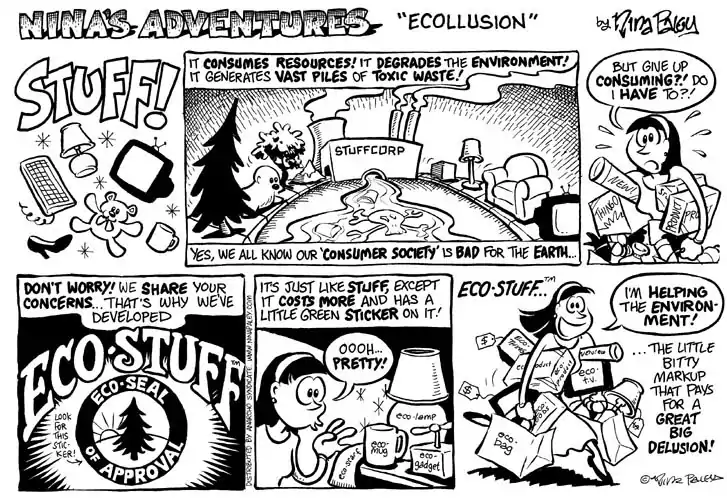Greenwashing
Greenwashing (also known as Ecollusion) is the practice of using woo, public relations tricks and/or superficial actions to improve a company's "green PR" without them actually doing much for the environment. Greenwashing is used to convince consumers that they are helping to "save the planet" by buying certain products that are in fact no more environmentally friendly than they were before — this improves profitability for a company as greenwashing can be cheap, but the increased revenue from a misled public can be massive. At best, greenwashing is about misleading the public into thinking that something is far more environmentally friendly than it really is; there may be some advantages to a product but not miraculous ones as the "green PR" implies. At worst, greenwashing is actively deceiving an audience or covering up the real environmental impact of a company or product.[note 1]
| a buncha tree-huggers Environmentalism |
 |
| Save the rainforests! |
| Watch that carbon footprint! |
|
v - t - e |
Key examples
Greenwashing often hypes up environmental aspects or takes them out of context - something that is better for the environment is not the same thing as something that is good for the environment. Some key examples are the likes of clean coal, which is considered to be a complete oxymoron. While "clean" coal is often cleaned with respect to additional pollutants such as sulphur containing compounds, its name is highly misleading - when you burn a fossil fuel, there is no such thing as clean. It may be better than burning conventional coal, but to describe it as "clean" is nothing more than a PR stunt and is actively misleading.
Further examples include various forms of automotive woo, which claim that a specially reformulated gasoline or adding some goo to your oil will cut pollution and improve fuel efficiency. In reality, just driving sensibly and keeping the engine in good condition produces the most dramatic drop in fuel consumption, as has been shown on several episodes of Top Gear where cars have been shown to travel far beyond their estimated mpg just by simple and cautious manoeuvring.
The Airbus A380
In 2015, the EPA and the California Air Resources Board accused Volkswagen of "installing software that switches on pollution controls during smog tests, then switches them off again so that drivers can enjoy more engine power on the road."[1] On January 4, 2016, the US Department of Justice filed a formal complaint against VW. "The complaint alleges that nearly 600,000 diesel engine vehicles had illegal defeat devices installed that impair their emission control systems and cause emissions to exceed EPA’s standards..."[2] Due to the scandal, the FTC accused VW of greenwashing in March of 2016.[3]
Sins of greenwashing
The marketing firm TerraChoice published two reports, first in 2007, then in 2009, detailing a list of the "sins of greenwashing", i.e. categories of greenwashing tactics. The initial report in 2007 included six sins of greenwashing[4], while the second report brought the tally to seven. Many of these "sins" show similarity to specific logical fallacies.
| The Sin | Similar logical fallacy | Description | Examples |
|---|---|---|---|
| Sin of the Hidden Trade-Off | Selective reporting | Suggesting a product as "green" (i.e., environmentally friendly) based on an unreasonably narrow set of attributes, ignoring other, possibly more important, attributes. | Paper/lumber products that promote their recycled content or sustainable harvesting practices without attention to manufacturing impacts such as air emissions, water emissions, and global warming impacts. |
| Sin of No Proof | Argument by assertion | Any environmental claim that cannot be supported by independently verifiable data or a reliable third-party certification. This was later sub-divided into another sin, the | Household lamps and lights that promote their energy efficiency without any supporting evidence or certification. |
| Sin of Vagueness | Weasel words, equivocation | Making claims that are ill-defined or broad and as such liable to be misunderstood and misinterpreted by the customer. | Just slapping the words "green", "all-natural", or something like that on the tin to make it sound good. |
| Sin of Irrelevance | Red herring | Making a claim that, although it may be truthful, is not helpful for the customer to choose a greener product. | Saying a product is CFC-free. CFCs have been banned in the United States for decades now, so no product has them. |
| Sin of [the] Lesser of Two Evils | Red herring | Making any environmentally positive claim about the benefits of a product in a given category, which, although that may be true, overlooks some problem intrinsic to the category itself. | Organic cigarettes.[5] |
| Sin of Fibbing | Deceit | Exactly what it says on the tin; outright lying. | In December, 2015, Nordstrom, Bed Bath and Beyond, JC Penney, and Backcountry.com were collectively fined $1.3 million by the FTC for advertising rayon textiles as made of bamboo.[6] It's sad, really. |
In a nutshell

Gallery
 Greenwashing before...and after.
Greenwashing before...and after.
See also
- Environmentalism
- Laundry ball
- Sunday school environmentalism
- Sustainability as an advertising gimmick
- Organic food
- The Non-GMO Project; marketers pay to put the "GMO-free" label on products, giving it more marketing "natural" appeal despite its worthlessness for the consumer.
External links
- StopGreenwash.org - a Greenpeace site devoted to greenwashing
- Guardian article on Chiquita bananas Rainforest Alliance certified
Notes
- So where exactly does the electricity to power your car come from?
References
- http://detroit.cbslocal.com/2015/09/21/epa-volkswagon-thwarted-pollution-regulations-for-7-years/
- https://www.justice.gov/opa/pr/united-states-files-complaint-against-volkswagen-audi-and-porsche-alleged-clean-air-act
- https://www.ftc.gov/news-events/blogs/business-blog/2016/03/ftc-alleges-defeat-device-rendered-vw-ad-claims-deceptive
- Read the original here. Unfortunately, their newer website fell prey to malware and going there will open you to phishing attacks. It's still up, at www DOT sinsofgreenwashing DOT org. Type it in yourself if you're that inclined to trade your credit card number for digital tapeworms.
- And, yes, these are actually a real thing:
- https://www.ftc.gov/news-events/press-releases/2015/12/nordstrom-bed-bath-beyond-backcountrycom-jc-penney-pay-penalties